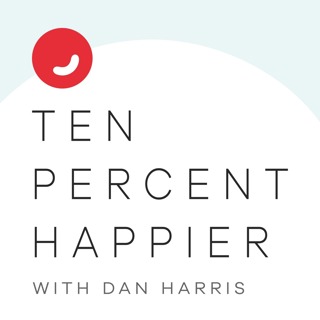
The Art and Science of Compassion | Thupten Jinpa
It can be incredibly frustrating when life-changing, world-changing concepts such as compassion and kindness are often presented as cliches, because scientific research strongly suggests that learning how to practice compassion -- through meditation and other modalities -- can genuinely change your life. And enough of us did it, it could maybe change the world. One of the people who is the best at getting this message out, in new and creative ways, is Thupten Jinpa. He is a former Tibetan monk who went on to go to Cambridge University, where he got a B.A. in philosophy and a Ph.D. in religious studies. Since 1985, he has been the principal English translator for His Holiness the Dalai Lama. In this conversation, we talk about developing a compassionate meditation practice, building kindness and empathy, the connection between intention setting and compassion, and identifying and regulating negative emotional reactions. A few technical notes: This episode is a rerun. We do reruns when we have episodes that are amazing that we think our newer listeners might enjoy. We also do them to give our staff a break once in a while. We actually recorded this conversation live in front of an audience at the Asia Society in New York City a few years ago. It was the day after the school shooting in Parkland, so you will hear a few references to that. Check out Joseph Goldstein's course on compassion in the Ten Percent Happier app: https://10percenthappier.app.link/CompassionWithJoseph Full Shownotes: https://www.tenpercent.com/podcast-episode/thupten-jinpa-repost
21 Juli 20211h 12min

The Voice in Your Head | Ethan Kross
The craving, complaining, and comparing voice in our heads can be the source of incalculable suffering, but is it all bad? And are there ways to talk to yourself that can turn your inner voice into a powerful ally? Ethan Kross is a Professor in the University of Michigan’s top ranked Psychology Department and its Ross School of Business and the author of the new book, Chatter: The Voice in Our Head, Why it Matters, and How to Harness It. In this conversation, we talk about why we have voices inside our head, how they can be either a blessing or a curse, how to access your inner coach rather than your inner critic, how changing our outer environment can impact your inner environment, and how you can use the much-maligned social media for support. Download the Ten Percent Happier app today: https://10percenthappier.app.link/install Full Shownotes: https://www.tenpercent.com/podcast-episode/ethan-kross-365
19 Juli 20211h 6min

Getting Over Yourself | Joseph Goldstein
For the uninitiated, Joseph Goldstein is one of the cofounders of the Insight Meditation Society (IMS) alongside Sharon Salzberg and Jack Kornfield. Since its founding, thousands of people from around the world have come to IMS to learn mindfulness from leaders in the field. In this episode Joseph covers strategies for getting over yourself. Every year, Joseph does a three-month retreat by himself at his home in Massachusetts. This year, he emerged with a bunch of thoughts on what’s called “the three proliferating tendencies,” or three “prapancas,” to use the ancient Pali term. These are three ways in which we perpetuate a sense of self -- not a healthy sense of self, but an unhealthy sense of self. You can think about the process of going deeper in meditation as a process of lightening up or getting less self-centered. Now, you’re about to get a master class in doing just that. Download the Ten Percent Happier app today: https://10percenthappier.app.link/install Full Shownotes: https://www.tenpercent.com/podcast-episode/joseph-goldstein-364
14 Juli 20211h 14min

How to Keep Your Relationships On the Rails | Kaira Jewel Lingo
Today’s episode is about a Buddhist tool for resolving conflict and keeping your relationships healthy. Today’s guest, Kaira Jewel Lingo, was an ordained nun of 15 years in Thich Nhat Hanh’s Order of Interbeing, and is now a lay Dharma teacher based on Long Island. She graduated from Stanford University with a B.A. and M.A. in Anthropology and Social Sciences. She’s edited a few books by Thich Nhat Hanh, including Planting Seeds: Practicing Mindfulness with Children. In this interview, Kaira Jewel talks about: the Beginning Anew practice (and how even skeptics can see the value in it); how Beginning Anew can strengthen relationships and resolve conflicts; the four steps of the practice; and her own experience with the practice, as both a teacher of it and a practitioner of it. If Kaira Jewel's insights on gratitude within the practice intrigue or inspire you, you might like a fantastic meditation we released recently on the Ten Percent Happier app called "Daily Gratitude Booster" by Matthew Hepburn. It's the perfect way to cultivate a regular practice of gratitude, which, like meditation itself, is a skill that you can improve. Check it out by downloading the Ten Percent Happier app wherever you get your apps (https://10percenthappier.app.link/install) or click the link in our show notes to be taken directly to Matthew's meditation: https://10percenthappier.app.link/DailyGratitudeBooster. Full Shownotes: https://www.tenpercent.com/podcast-episode/kaira-jewel-lingo-363
12 Juli 202142min

The Science of Happiness | Emiliana Simon-Thomas (2020)
In a previous interview with Dan, the Dalai Lama said something along the lines of, “everyone’s selfish; that’s the way we’re wired. But if you’re going to be selfish, you should be wisely selfish.” Wise selfishness takes into account the fact that what really makes humans happy is to care for other people. This notion has been a central part of the Buddhist platform for millennia, but is now being borne out in scientific research. Today’s guest is Emiliana Simon-Thomas. She is the science director of the Greater Good Science Center at UC Berkeley, where she is a co-instructor of its Science of Happiness online course. In this conversation, Emiliana talks to us about the difference between empathy and compassion, how we can be happier by being more compassionate and connected, what we misunderstand about love, and a more scientific definition for that culturally loaded term. Just to note -- this is a re-run of an older episode we pulled out of our vault for a few reasons: 1) It’s summer and we want to give our tireless staff a break; and 2) This is one of our all-time favorite episodes and one that many of our newer listeners may not have heard. For more science-based happiness practices, you can download the Ten Percent Happier app today: https://10percenthappier.app.link/install. Full Shownotes: https://www.tenpercent.com/podcast-episode/emiliana-simon-thomas-repost
7 Juli 202155min

Rethinking Your Relationship to 'Stuff' | The Minimalists + Oren Jay Sofer
We’ve been meaning to tackle our relationship to 'stuff' for a while now. This subject can go deep. It’s not just about decluttering (although that can actually be pretty substantial work); it’s about rethinking your whole life. Recently we spoke to a pair of gentlemen known as The Minimalists -- whose names are Joshua Fields Milburn and Ryan Nicodemus. They’re perhaps best known for their documentaries on Netflix: “Minimalism” and “Less is Now”. They also have a very popular podcast and have written a series of books. Their latest book, “Love People, Use Things”, comes out this month. In this episode, we talk about their powerful and painful personal path to Minimalism; the freedom that they say comes from living with less; how to actually do Minimalism; and the pitfalls of the path. And as a bonus pairing, we’ve brought back a Ten Percent Happier favorite, Oren Jay Sofer. Oren is a renowned Buddhist teacher who has been meditating for nearly a quarter of a century. As part of his training he spent over two years living with less as a Buddhist renunciate, and he makes a compelling case for bringing minimalism into the mindfulness practice, and for letting go. For more from Oren and other great meditation teachers, download the Ten Percent Happier app today: https://10percenthappier.app.link/install. Full Shownotes: https://www.tenpercent.com/podcast-episode/the-minimalists-oren-sofer-362
5 Juli 20211h 5min

Why Men Armor Up | Daniel Ellenberg
Today's episode is a deep dive into the male operating system and how it can be upgraded. Today's guest, Daniel Ellenberg, is a psychotherapist, marriage and relationship therapist, author, and facilitator. He has been leading men’s groups for over 30 years and is the new sitting president of the American Psychological Association's “Division 51: Society for the Psychological Study of Men & Masculinities." In this conversation, Dr. Ellenberg explains: what masculinity actually means; what prevents men from forming bonds with other men; “traditional masculinity ideology”; why men die earlier than women; the importance of self-compassion for men; and how to be a good role model as a dad, friend, and fellow man. Download the Ten Percent Happier app today: https://10percenthappier.app.link/install Full Shownotes: https://www.tenpercent.com/podcast-episode/daniel-ellenberg-361
30 Juni 20211h 6min

Self-Compassion Ain’t Always Soft | Kristin Neff
There’s a widely held assumption that if you have a warmer, friendlier relationship with yourself, you will not only slack off and be ineffective, but also that you will be a doormat. My guest today says: not true. She’s making the case that self-compassion, when properly understood, can lead to a kind of ferocity. It can help you stand up for yourself and others. Kristin Neff is the central pioneer in the field of self-compassion research and her work has had a massive impact on me and my own work. She is an Associate Professor of Educational Psychology at the University of Texas at Austin. She’s the author of the book Self-Compassion: The Proven Power of Being Kind to Yourself, and now she has a new book, called Fierce Self-Compassion: How Women Can Harness Kindness to Speak Up, Claim Their Power and Thrive. This conversation is for everyone, whether you identify as a woman or not. These concepts are universal, although, as you will hear Kristen argue, there is special importance for women. And speaking of gender, we are dedicating this week to that subject. Coming up on Wednesday, we’re going to talk about masculinity with a guest named Daniel Ellenberg. In this episode with Kristin Neff, we talk about: tender self-compassion vs. fierce self-compassion; the three main forms of fierce self-compassion; how to take a fierce self-compassion break; destructive vs. constructive anger; why she wrote the book specifically for women, and why you should read it, regardless of your gender socialization; how men can help the women in their lives develop this kind of ferocity; and how self-compassion can help us face our biases. For more resources on self-compassion, you can download the Ten Percent Happier app today: https://10percenthappier.app.link/install Full Shownotes: https://www.tenpercent.com/podcast-episode/kristin-neff-360
28 Juni 20211h 1min





















